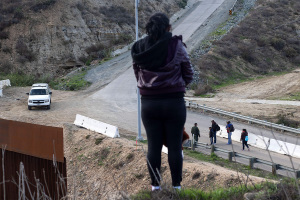Delegates from the China Christian Council Visits Members of the NCC
Reaffirming friendship, propagating growth
New York City -- Delegates from the China Christian Council met with members from the U.S. National Council of Churches and the Church World Service to reaffirm their longstanding affiliations, Oct. 14. The nine-member group visited NCC and CWS’s New York offices as part of their extended visit to the U.S. from Oct 4-26.
“We are looking forward and hope our visit will help promote more mutual understanding and mutual support,” said the Rev. Cao Shengjie, president of CCC.
According to Cao, the Church is rapidly growing in China, with more than 16 million Protestants and 50,000 Protestant churches and meeting places in China.
The church is prospering now in China," said Cao. "Some people have a memory of the Cultural Revolution. That ended more than 20 years ago. They take for granted things are the same. They are not."
In certain cases of religious persecution, particularly in isolated places where the actions of local authorities don’t reflect the general societal trend of opening up toward religion, the Rev. Cao said, "We try to pass those cases to the government and ask for correction."
According to the Rev. Cao, China’s government increasingly recognizes that "religion has a deep root in people’s heart - and can play a positive role. We encourage our members to be a good Christian and a good citizen at the same time."
Chairperson of the National Committee of the Three-Self Patriotic Movement of the Protestant Churches in China, Ji Jianhong, agreed with Cao, emphasizing a need for international friendships among churches to extend that growth of legal recognition in China.
The Chinese church’s principle of independence in propagation, support and governance "doesn’t preclude friendship.... Mutual visits are a must for developing the relationship between the churches of our two countries," he said.
In response, the top executives of the NCC and CWS thanked the delegation for their open involvement in the ecumenical movement.
"We thank God for bringing you here and for the good news about Chinese Christians," said the Rev. Dr. Bob Edgar, NCC General Secretary. Said the Rev. John L. McCullough, CWS Executive Director, "You bear witness by your very presence of the meaning, power and presence of Christ."
In addition to greetings, the delegation brought background information on the history of Christianity in China. According to the report, mission work to China dates back to the seventh century. Then, after a millennia, the protestant Christian community grew in China as a result of the missionary efforts from the 18th to 20th centuries.
In 1954, Chinese Protestant Christians initiated the Three-Self Movement, which mapped out an independent road to building the church - and moved Chinese Protestantism away from its perceived association with western imperialism.
During the Cultural Revolution, between 1966 and 1976, churches and Christians continued to experience persecution and many churches were closed down. Then China opened up, and in 1980 the China Christian Council was established. The China Christian Council has established 18 theological seminaries and Bible schools and more than 70 centers across China distributing Bibles and hymnals.
According to Cao, the priorities outlined by the Chinese church include "reconstruction of theological thinking, personnel training, development of churches and church organizations, and social service," according to information brought by the delegation. Challenges include "deepening understanding of the faith among believers."
The Rev. Cao was critical of outside groups, including some from the United States, that come to the Chinese Christians and say, "We want to help but you must do things the way we want. They tell us, ‘You aren’t a real church.’ That sometimes causes a split in our church...and social disorder."
Nonetheless, Cao thanked the NCC for its statement f support for the three-self principles of the Chinese church: self-supporting, self-governing and self-propagating.
Dr. Antonios Kireopoulos, the NCC’s Associate General Secretary for International Affairs and Peace, replied, "You can count on us to be a partner in spreading the Gospel, extending Christian compassion, and working for peace and justice."
Both Rev. Cao and Presbyter Ji were elected to their positions at the 7th National Chinese Christian Conference in May 2002. Rev. Cao also is vice president of the National YWCA of China, and Presbyter Ji is executive vice president of the Nanjing Union Theological Seminary.




























